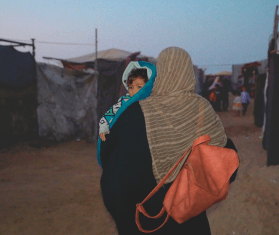NEW YORK/KABUL, FEBRUARY 6, 2023—A broken health care system, widespread poverty, and increased restrictions placed on women are fueling the current humanitarian crisis in Afghanistan, said Doctors Without Borders/Médecins Sans Frontières (MSF) today. These findings are outlined in a new report by the international medical humanitarian organization that makes several recommendations to policymakers, international actors, donors, and local authorities to improve access to health care. They must strengthen primary health care, address the issues contributing to the economic crisis, and ensure access to education and employment for women, said MSF.
While surveying caregivers and patients at its facilities for its report—titled Persistent barriers to access health care in Afghanistan: The ripple effects of a protracted crisis and a staggering economic situation—MSF found that 95 percent of respondents said they faced difficulties affording food in the past 12 months. Most attributed this to unemployment or stagnant salaries against the backdrop of a significantly increased cost of living, especially the cost of basic food items. At the same time, sanctions imposed by the international community have crippled the economy, while $7 billion of the Afghan Central Bank’s assets remain frozen abroad and inaccessible to people in need.
“Sometimes, mothers are so malnourished they can’t produce milk,” said Hadia*, a member of MSF’s medical staff in Herat Regional Hospital. “We see them putting tea in bottles to give to newborn babies—only seven or eight days old—which can be very dangerous.”
February 06 11:15 AM
MSF report: Persistent barriers to health care in Afghanistan
Hopes that the end of the war would reduce obstacles to accessing health care have been dashed, and replaced by new barriers and fears.
Read more
In addition to access to food, the economic crisis has also severely impacted when people seek medical care; eighty-eight percent of people MSF surveyed for its report said that they either delayed, suspended, or decided not to seek medical care in 2022—more than in 2021.
“One of the main problems in Afghanistan is that peripheral health facilities aren’t well-equipped, adequately resourced, or properly staffed,” said Filipe Ribeiro, MSF’s country representative in Afghanistan. “This means people in rural areas need to travel vast distances for quality treatment, even though they often cannot afford such journeys without plunging themselves into debt. Hopes that the end of the war would significantly reduce obstacles to accessing health care were dashed by new barriers and fears. The journey to hospitals may be less dangerous after the war, but it certainly became more difficult to afford.”
Marieh*, who sought care for her child, was one of many who struggled to afford medical care and transport before arriving at the MSF-supported Herat Regional Hospital.
"When my child was sick, we went to one of the private clinics and received a prescription for drugs that cost 1,000 AFG [around $12],” she said. “They didn’t help. We also tried a nearby public hospital, but doctors there gave us only half a tablet, not all the medication [we needed]. Now we’re here. My baby is worse, and I owe a lot of money we borrowed for transport.”

The health situation in Afghanistan is even worse for women. More than 60 percent of the surveyed respondents for MSF’s report said women face more significant obstacles when trying to access health care compared to men, mainly due to the requirement for women to be accompanied by a male relative when leaving home. When no male relative is available to accompany them—or if they cannot afford to pay for transport for two people—this can prevent women from seeking care or working to provide for their families. The government of Afghanistan’s recent decision to bar women from working for non-governmental organizations and from university-level education will likely only worsen women’s access to health care.
“It is already difficult in some of our projects to fill the necessary positions, including gynecologists,” Ribeiro said. “If women are not allowed to study, where will the next generation of doctors, midwives, and nurses come from? MSF teams in our maternity projects in Afghanistan assisted with more than 42,000 deliveries last year, and over 8,000 of them were accompanied by direct obstetric complications. Prohibiting women from learning and working will put the lives of mothers—and the lives of their children—at a greater risk.”
*The names of Afghans quoted in this press release have been changed to protect their identities.
MSF’s new report brings together medical data, interviews, and questionnaires from patients, caretakers, and staff in MSF’s projects in Helmand, Herat, Kandahar, Khost, and Kabul. MSF previously documented barriers to accessing health care in Afghanistan in reports published in 2014, 2020, and 2021.




